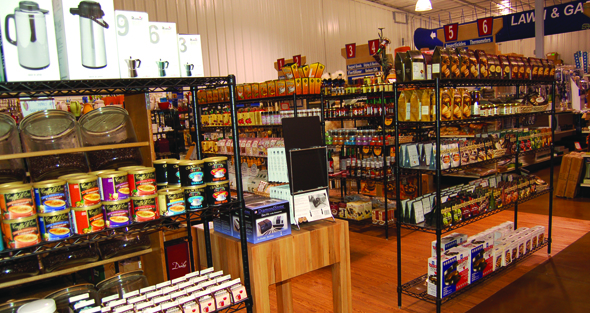At Hooten’s Hardware, we’re all about selling hardware. We’ve got the products consumers need, whether they’re professional builders looking for enough lumber to build houses or DIYers who need just one more quart of Superman Blue to finish their son’s new room.
If you need proof, pull into our parking lot; you’ll see four different buildings stocked full of all the core hardlines you can think of. We’ve spent years figuring out the right product mix, and while I am a humble man, I’d say our team has nailed it. (See what I did there?)
So, when one of our employees suggested we bring in garlic-roasted chip dip, I couldn’t help but stare at her with my mouth open.
I wanted to say, “We’re Hooten’s Hardware, not Walmart.”
But I knew every management training article I’ve ever read would advise against my hasty response, so I asked her to expand on the idea.
Fast forward five years, and we’re still the go-to for the pros and the DIYers, and we’ve still got hardlines stocked to the brim, but we also offer a full line of dips, housewares, Case knives, hunting guns, appliances and more.
Sourcing Niche Categories
Finding niches can be exciting, a little nerve-racking and, unfortunately, risky. I like to say finding the right niche is more an art than a science, because the reality is that you can do as many demographic studies or competition shops as you like, but you still have to take a risk when you put a niche in a home improvement store.
We find a majority of our niches through trade shows, mostly because shows make it easy to compare different products and find new ones in a short period of time. What I suggest retailers do, however, is not limit themselves to just their biannual distributor markets. Don’t get me wrong—I found some winners at these markets, but I also have several members of my staff go to different out-of-the-box trade shows, such as the Kitchen and Decor show in Dallas.
I do tend to shop the competition to get an idea about what consumers in the area might be wanting, but I take finding products a step further. I keep an eye on niches competitors bring in, but, more importantly, I take note of the niches they take out.
I want everyone—sales reps, employees, even my wife—to help find new products. My reps have come to know me, and we’ve found some of our best lines this way.
Another tip is to get a mix between smaller local brands, such as my chip dips, which gives our store a local and natural flair, and some national lines where I can piggyback on national advertising.
Go All In
Different people will have different approaches to stocking niche selections. If you want to become a destination, I believe you have to stock products very deeply; sometimes even making room for entire lines.
I run this model across all my niches. I believe that in order to give a niche the proper chance, you do have to have enough products in the category to excite people. Maybe you don’t have to have 50 different colors of gardening shoes, but why not try five or 10? It allows you to create excitement.
Let Your Employees Drive
At Hooten’s, we’re big on giving our employees responsibility—especially when it comes to niches. We figure that not only are our employees staff members, but they’re also consumers. Some of our best promotions come from our employees.
Seasons are great times to introduce or try new niches. Because you’ll be doing special holiday or back-to-school promotions, you easily can introduce the new lines.
If I’m doing some kind of edible item, we always like to offer samples and discount new items to get them moving. Another type of promotion we find very helpful are demonstrations. On the days we do demos, we often sell out of lines we promote that day.
How Do You Know If You’ve Found a Winning Niche?
Sometimes figuring out if a niche will work is just a retail game. You play the odds. But as my peer, T.J. Comstock, noted in his article in the March issue of Hardware Retailing, it’s imperative to measure the success of your niches. Frankly, it’s important to measure the success of every line in your store.
I’ll use purchase history reports to regularly review my categories, rotating around to each category. If we haven’t been doing well in a particular line, there are most likely two possible reasons. First, maybe we aren’t stocking the right items in that particular line. Maybe the blue garden shoes aren’t popular, but the green would sell like wildfire. The second, and less exciting, cause could be that the niche just doesn’t do well in my market or with my customers.
The bottom line in knowing if a product will work is that you won’t know unless you try. You can never predict what the public will or won’t like. You just have to try it and be diligent in liquidating the lines if they don’t work.
 Hardware Retailing The Industry's Source for Insights and Information
Hardware Retailing The Industry's Source for Insights and Information








